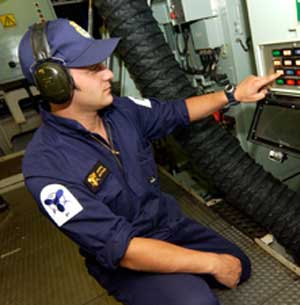Navy Technician
Tasks & duties

When posted at sea, navy technicians may do some or all of the following:
-
maintain and repair the weapons and electronic warfare systems and sensors
-
maintain and repair weaponry ranging from large missiles to small arms
-
maintain and repair mechanical equipment and systems
-
maintain and repair detection equipment and systems such as radar and sonar
-
maintain and repair communications equipment and systems such as radios, satellites, communication and information systems
-
maintain the ship’s husbandry, such as the outside of the ship or the equipment and fittings, by doing a variety of cleaning duties, painting and minor repair work
-
work as part of the ship's crew
-
act as a lookout at sea
-
transfer stores and personnel between ships at sea
-
carry out towing operations
-
board other ships to conduct checks
-
help refuel the ship
-
anchor the ship
-
participate in wartime-scenario training exercises, such as damage-control exercises
When posted onshore, navy technicians may do some or all of the following:
-
conduct equipment trials
-
maintain and repair equipment alongside ships or on docked ships
-
conduct training
-
complete administration duties
Specialisations
Navy Marine Technician
Navy marine technicians maintain and repair:
-
propulsion equipment such as diesel engines, gas turbines and jet engines
-
electrical systems such as power generators, machinery controls and monitoring systems
-
mechanical equipment such as hydraulic and pneumatic systems, and the ship's refrigeration, air-conditioning and sewerage treatment system.
Navy Weapons Technician
Navy weapons technicians maintain and repair:
-
large weaponry such as surface-to-air missiles, torpedoes, the five inch gun and the Phalanx
-
small arms such as pistols, rifles and machine guns.
Navy Electronics Technician
Navy electronics technicians maintain and repair:
-
electronic warfare systems and sensors
-
communication equipment such as radios and satellites
-
detection equipment such as radar and sonar
-
navigation equipment.
Skills & knowledge

Navy technicians need to have:
-
knowledge of weapons
-
knowledge of how to operate, maintain and repair various mechanical and electronic systems, sensors and equipment
-
knowledge of how to use and care for the ship's equipment
-
knowledge of Royal NZ Navy regulations and safety procedures
-
practical skills
-
good communication skills
-
computer skills
Entry requirements
To enter the Royal NZ Navy you must be at least 17 years old and eligible to be a New Zealand citizen. You need to pass a series of psychometric tests and an interview. You must then pass medical and fitness tests and meet an acceptable standard of eyesight and hearing. You also need to be given security clearance, so any criminal convictions you have will be looked at.
To become a navy technician you need to have NCEA Level 1, including 12 credits at Level 1 or above in maths and science or physics, or School Certificate equivalent.
Training on the job
On-the-job training begins with a 10-week Basic Common Training Course (BCT) at the Royal NZ Naval College followed by Basic Branch Training (BBT) where you begin training in your specialist area.
If you choose to become a marine technician, you complete a 27-week BBT course that teaches you the main operating principles behind the equipment and systems you will be responsible for. You are also able to study towards a National Certificate (Level 4) in Electrical Engineering or a National Certificate (Level 4) in Mechanical Engineering (Plant Maintenance), which is recognised by the New Zealand Qualifications Authority (NZQA) as a civilian qualification.
If you choose to become a weapons technician or electronics technician, you will be given time for on-the-job experience after your BCT to decide which specialisation you would like to pursue.
In both of these specialisations you are able to study towards a National Certificate (Level 2) in Electrical Engineering or a National Certificate (Level 4) in Electronics Technology (Radar and Communications), which are recognised by NZQA as civilian qualifications.
Senior navy technicians can study towards a National Diploma in Engineering.
All navy personnel are given the opportunity to complete relevant part-time tertiary study (fully paid for by the Navy) throughout their career.
Video
NZDF - Navy - Marine Technician
From just a job on you tube
Related courses
Communications Equipment Installation and Maintenance
Communications Technologies
Electrical Engineering
Electronic Engineering
For more information, please refer to Career Services.
Document Actions
